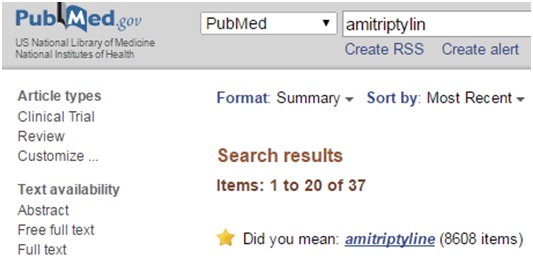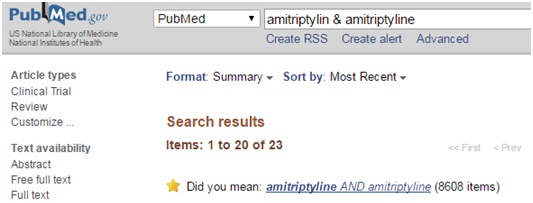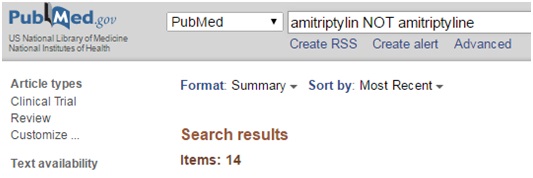Drug names are difficult to remember, pronounce, and spell. For example, which of the following, if any, is the correct spelling?
• amitriptylin
• amitryptiline
• amitriptylline
• amytriptyline
• amitriptiline
One way to find out is to enter the name into PubMed. Here’s what I got when I searched for “amitriptylin”:

The search engine asked me if I meant “amitriptyline”, which is the correct spelling.
But what about those 37 hits that I got by searching for the wrong spelling “amitriptylin”? Well, when I searched for “amitriptylin & amitriptyline” I got the following:

That gave me only 23 hits, compared with the previous 37; 14 hits were missing. And when I searched for “amitriptylin NOT amitriptyline”, there they were:

In other words, unless you searched for the misspelling “amitriptylin” as well as the correct spelling “amitriptyline”, you would have missed 14 publications.
In order to determine how many papers you would miss if you didn’t enter misspellings when you search for drug names, Robin Ferner and I searched PubMed systematically for misspellings in 30 drug names that are often misspelled on prescription charts (which we called the test set) and 30 randomly chosen control names. The full findings are published in The BMJ’s Xmas issue, but here is a summary:
• the 30 standard names of drugs in the test set gave 325 979 hits in total, and 160 misspellings of those names gave 3872 hits that weren’t picked up by the correct spellings (we called them hidden reference variants);
• the standard names of the control set gave 470 064 hits, and 79 misspellings of those names gave 766 hits that weren’t picked up by the correct spellings;
• letter substitutions (particularly i to y and vice versa) and omissions (for example, “amitiptyline”) together accounted for 2924 (74%) of the hidden reference variants;
• names ending in “in”, “ine”, or “micin” were commonly misspelt;
• failing to search for misspellings of “gentamicin,” “amitriptyline,” “mirtazapine,” and “trazodone” missed at least 19 systematic reviews.
So, if you are doing a systematic review that includes drug names, you’d better include misspellings as well as the proper ones when you search. And you’d better include misspellings of all drug names, not just those that are commonly misspelled.
Sometimes spellings that were once current, but are no longer, persist. For example, searching for “amoxycillin NOT amoxicillin” yields 1143 hits that you would otherwise have missed by searching for “amoxicillin” alone. And variant spellings that are found in different nomenclatures can be problematic too. For example, thiomersal is the International Nonproprietary Name (INN) of a compound that is called thimerosal in the US, but if you only search for the former you will miss 1572 hits.
And it’s not just drug names that are affected. When I searched for “staphyloccus NOT staphylococcus” I found 44 hidden reference variants. And why would you otherwise think of searching for “staphyloccus”? After all, there’s no such orgasm.
 Jeffrey Aronson is a clinical pharmacologist, working in the Centre for Evidence Based Medicine in Oxford’s Nuffield Department of Primary Care Health Sciences. He is also president emeritus of the British Pharmacological Society.
Jeffrey Aronson is a clinical pharmacologist, working in the Centre for Evidence Based Medicine in Oxford’s Nuffield Department of Primary Care Health Sciences. He is also president emeritus of the British Pharmacological Society.
Competing interests: None declared.
